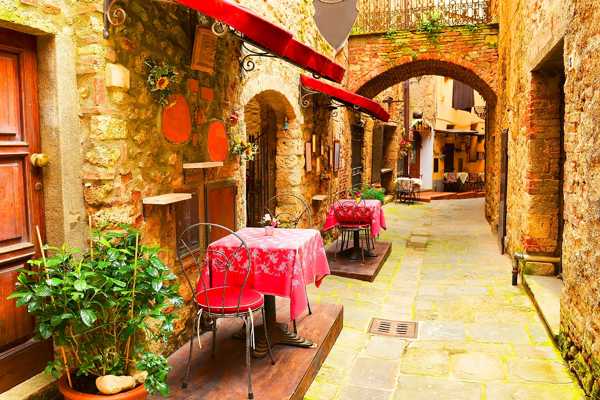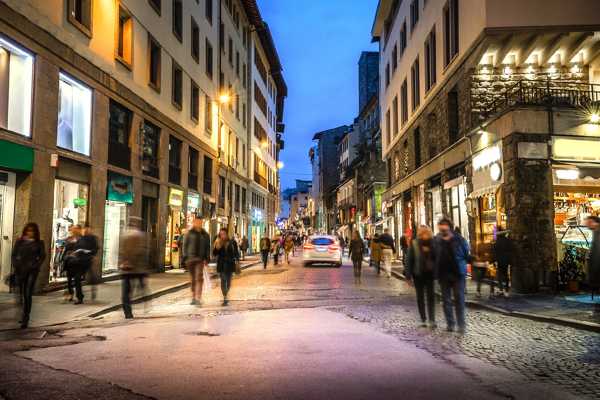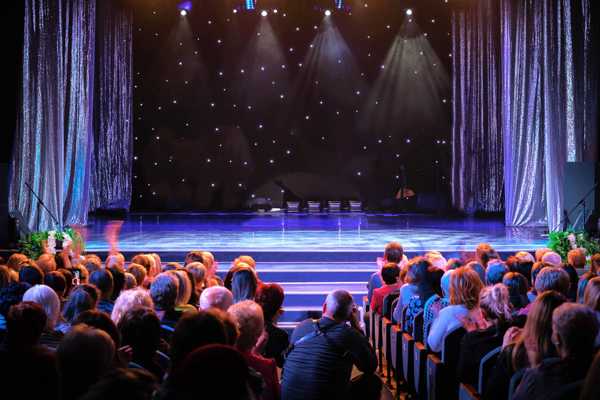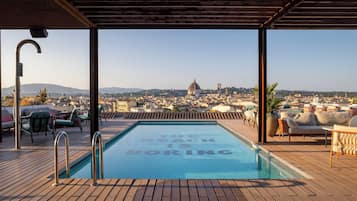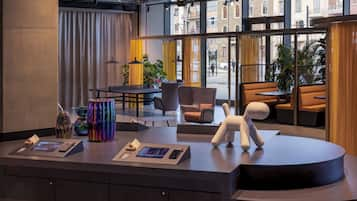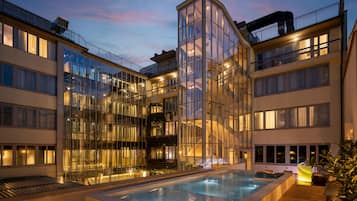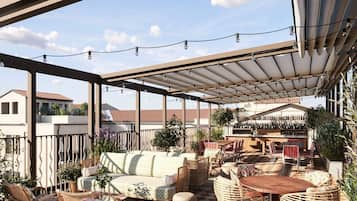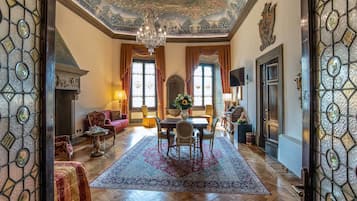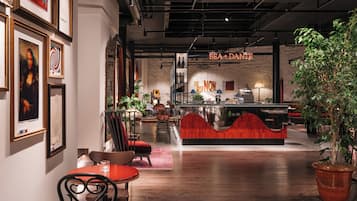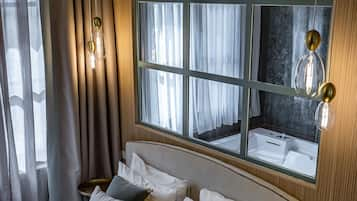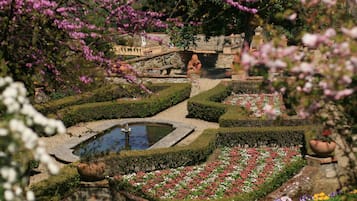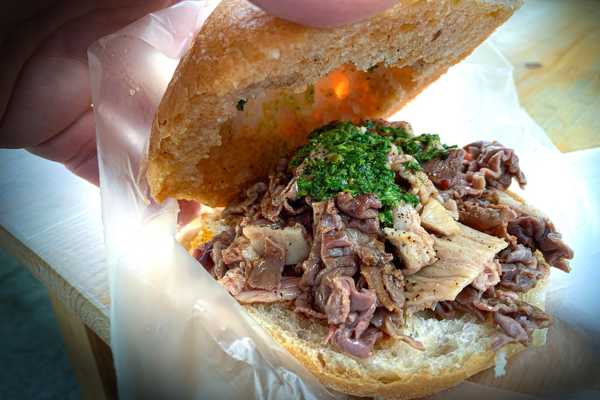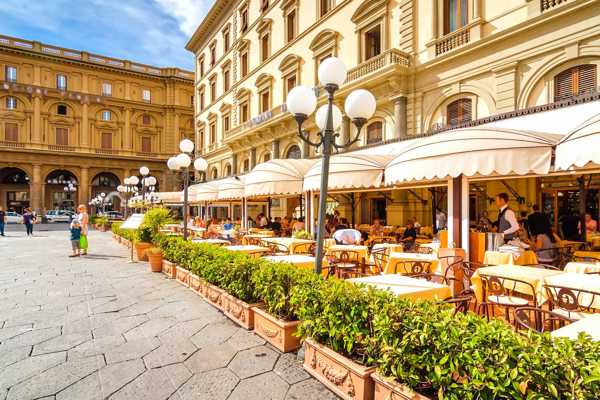The most popular streets in Florence are lined with grand Renaissance palaces, medieval buildings, and restaurants galore, not to mention shopping outlets ranging from artisan workshops to luxury department stores. Roam the streets of the Tuscan capital, and you’ll soon see why the city is famous for fashion, art and architecture.
Whether you want to stock up on designer goods, pick up some hand-crafted leatherware or simply soak up the Florentine atmosphere and its historic landmarks, Florence has the perfect street for you. Learn about the city's most popular streets to make the most of your stay.
- 1
Via de’ Tornabuoni
Florence’s home of high-end fashion

- Sang trọng
- Tín đồ mua sắm
Via de' Tornabuoni is a mecca of luxury shopping in Florence. This thoroughfare is lined with major designer fashion houses, including Gucci, Prada and Emilio Pucci. Besides clothing, cosmetics and jewellery stores, you can also visit historic palaces and museums like the Palazzo Spini Feroni and the Salvatore Ferragamo Museum.
If you want to indulge while shopping along Via de’ Tornabuoni, we recommend picking up some designer perfume from Olfattorio Bar a Parfums Firenze. Via de' Tornabuoni sits between the Saint Trinity Bridge and the Palazzo Antinori. Even though the street is pedestrianised, you might want to visit in the morning to avoid jostling with crowds.
Bản đồ - 2
Via Camillo Cavour
A showcase of Renaissance architecture and history

- Lịch sử
- Sang trọng
- Ảnh
- Tín đồ mua sắm
Via Camillo Cavour is one of the main streets in Florence’s historic centre. It’s famous for its abundance of Renaissance-era buildings, which include palaces and museums. Artisan stores and clothing boutiques, plus many cafes and restaurants provide plenty in the way of shopping and dining. You can also visit Riccardi Medici Palace, which showcases 400 years of Florence’s artistic history.
To soak up the atmosphere and architecture of Via Camillo Cavour, start at the Riccardi Medici Palace and walk north, passing through the Piazza San Marco before arriving at Piazza della Libertà. Iconic attractions like the Florence Cathedral and Accademia Gallery are just a short walk away from Via Camillo Cavour.
Bản đồẢnh của sailko (CC BY-SA 3.0) đã điều chỉnh
- 3
Viali di Circonvallazione
A historic road that marks the border of Florence’s historic centre

- Lịch sử
- Ảnh
Viali di Circonvallazione is a series of wide, 6-lane boulevards that follow the same outline as Florence’s ancient walls, meaning it essentially marks the borders of the city’s UNESCO-listed historic centre. The wide boulevards, which date back to 1865, were designed to resemble the boulevards of Paris. It’s one of the best routes to follow to get a glimpse of Florence’s diverse central landmarks.
While following Viali di Circonvallazione, you might want to plan stops along several streets, bridges, and landmarks. Must-sees include Ponte alla Vittoria, Piazza Vittorio Veneto, and Piazza Beccaria. However, we recommend avoiding this busy traffic artery during rush hour.
Bản đồ - 4
Via Maggio
A creative hub with many antique stores

- Gia đình
- Lịch sử
- Ảnh
Via Maggio has long been one of Florence’s main hubs for art, creativity and culture. In addition to numerous antique stores, galleries and ateliers, the street is lined with Renaissance palaces that once belonged to noble families like Pitti, Corsini and Ridolfi. You’ll also find an abundance of fashion boutiques and several museums.
If you want to take in the sights of Via Maggio’s palaces and creative outlets, walk north from Ponte Santa Trinita (Saint Trinity Bridge) towards Via Romana and continue towards the Porta Romana gate. While you're in the area, we recommend setting aside around 1 hour to explore the eccentric La Specola, formally known as The Museum of Zoology and Natural History.
Bản đồẢnh của sailko (CC BY-SA 3.0) đã điều chỉnh
- 5
Lungarno Torrigiani
Grand architecture overlooking the Arno river

- Ẩm thực
- Lịch sử
- Giải trí về đêm
- Ảnh
Lungarno Torrigiani runs along the Arno river’s south bank, from the Ponte alle Grazie to Via de’ Bardi. It’s one of the best stretches in Florence to admire Renaissance architecture overlooking one of the city’s main waterways. From here, you take in views of landmarks like Ponte Vecchio, the Vasari Corridor, and the Uffizi Gallery.
The street just behind Lungarno Torrigiani has many restaurants, palaces, and live music venues. Visit just before sunset to admire the city views before spending the rest of your evening at one of the nearby restaurants or music clubs.
Bản đồ - 6
Via dei Calzaiuoli and Via Roma
The shopping hub of Florence

- Lịch sử
- Sang trọng
- Ảnh
- Tín đồ mua sắm
Via dei Calzaiuoli and Via Roma are 2 parallel-running streets that make up the main shopping hub of Florence. Both streets connect the iconic Piazza del Duomo with Piazza della Signoria, one of Florence's central squares. Here, you'll see beautiful architecture and luxury brands such as Armani, Valentino and Fendi.
If you’re shopping for fashion, we recommend checking out the nearby La Rinascente department store, where fashion and homeware stores occupy 6 levels of a historic building. You can soak up the cityscape by enjoying a spritz on the rooftop.
Bản đồ - 7
Borgo San Jacopo (Via Santo Spirito)
A medieval street lined with palaces and workshops

- Gia đình
- Lịch sử
- Ảnh
Borgo San Jacopo, which also goes by the names of Borgo San Frediano and Via Santo Spirito, is a street that showcases Florence’s medieval structure. Here, you’ll see ancient homes, grand palaces and artisan workshops that reflect the city’s artistic culture. It’s also located between the famous Saint Trinity Bridge and Ponte Vecchio.
While you’re in the area, we recommend visiting historical landmarks such as the 18th-century Church of Santa Felicita and the 16th-century Grotta del Buontalenti del Giardino di Boboli. You can admire a view of Borgo San Jacopo backdropped by the Ponte Vecchio by walking across the Saint Trinity Bridge.
Bản đồ - 8
Vasari Corridor (Corridio Vasariano)
An enclosed walkway for the noble families of Florence

- Giá rẻ
- Lịch sử
- Ảnh
The Vasari Corridor is an enclosed and elevated walkway that’s decorated with fine art. It was constructed to allow the Medici family and high-ranking nobles to walk from the Pitti Palace to Ponte Vecchio without having to mingle with the city’s poor. Today, it’s one of the best places in Florence to get a glimpse into the lives of the wealthy during the Renaissance period.
In the Uffizi section of the Vasari Corridor, you’ll see a large collection of famous self-portraits of the city’s noble families. Visit the Vasari Corridor early in the morning to avoid the crowds and enjoy unobstructed views of the street on the Ponte Vecchio bridge.
Bản đồ - 9
Ponte Vecchio
A historic bridge and traditional shopping destination

- Lịch sử
- Ảnh
- Tín đồ mua sắm
Constructed in 1345, Ponte Vecchio is the oldest standing bridge in Florence. Besides being a top attraction for history buffs, Ponte Vecchio attracts shoppers looking for souvenirs and jewellery, particularly items of silver. Though the bridge has 2 levels, the upper floor remains closed except for special events. If you want to observe Ponte Vecchio from above, you can walk through the Vasari Corridor.
Don’t be afraid to haggle for goods while shopping on Ponte Vecchio. If you just want to admire the medieval architecture of the bridge, you can get a full view of the bridge by walking along the riverbanks or embarking on a boat tour.
Bản đồ - 10
Via dei Serragli
A historic street lined with Florentine artisan workshops

- Ảnh
- Tín đồ mua sắm
Via dei Serragli, in the Oltrarno district, has a diverse array of local artisan workshops. Here, you can stock up on leather goods, clothing and vintage homewares from Florentine designers, making it one of the best shopping streets to find unique products in the city.
Via dei Serragli runs all the way from the 13th-century Porta Romana city gate to the Arno river. When you need a break from the urban frenzy, you can enjoy a picnic in a park. Standouts include Giardino Torrigiani and Giardino Corsi. Shopping-wise, we recommend Frame for clothing, Quoio for leather goods, and Reinhard Plank for locally made footwear or hats.
Bản đồẢnh của sailko (CC BY-SA 3.0) đã điều chỉnh

